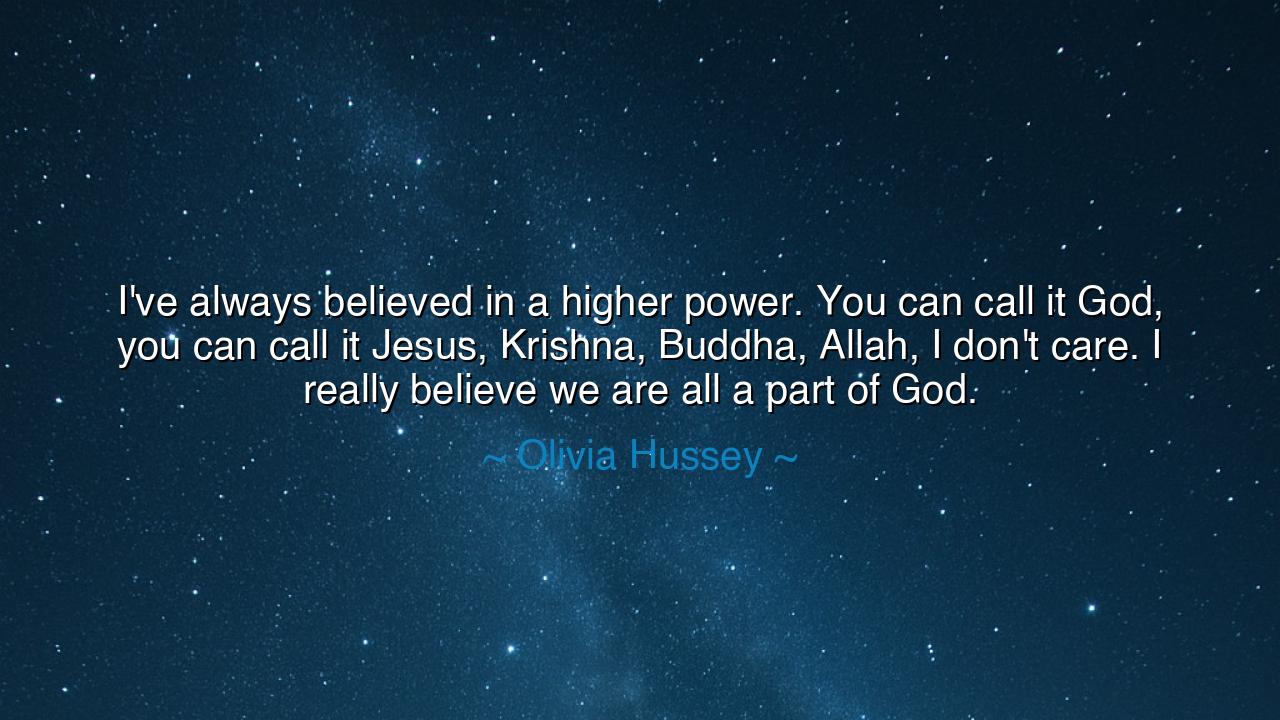
I've always believed in a higher power. You can call it God, you
I've always believed in a higher power. You can call it God, you can call it Jesus, Krishna, Buddha, Allah, I don't care. I really believe we are all a part of God.






Olivia Hussey’s words echo through the ages, like the sound of a distant bell tolling in the heart of the cosmos: “I’ve always believed in a higher power. You can call it God, you can call it Jesus, Krishna, Buddha, Allah, I don’t care. I really believe we are all a part of God.” This belief, ancient as the stars, speaks of a profound truth — that all life, all existence, flows from the higher power that shapes the universe. No matter the name we assign, there is but one essence, one source, uniting all beings in a sacred harmony.
The idea of the higher power is not foreign to those who have walked the earth before us. It is the song of the mystics, the prophets, and the sages — those who saw through the veil of the physical and touched the divine within. The teachings of Krishna on the battlefield of Kurukshetra remind us that all souls are but fragments of the eternal soul, and in the words of Jesus, “I and the Father are one,” we hear the call to see ourselves as the children of the Divine. These ancient voices, though speaking in different tongues, all resonate with the same divine truth: that we are not separate from God, but a part of God.
Consider the great philosopher Socrates, who, though not bound to one faith or temple, believed in a guiding force — the higher power — that shaped his actions and thoughts. It was this divine presence that led him to seek wisdom, to challenge the conventions of his time, and to die in pursuit of truth. His death was not a defeat, but a return to the divine unity he had always known to exist within himself and all things. In this way, the idea that we are all a part of God is not a lofty ideal, but a truth to live by — one that brings courage to the heart of the seeker and purpose to the steps of the pilgrim.
This truth is as old as time itself — from the humblest beggar in the streets to the greatest conquerors in history, all are drawn from the same source. Higher power manifests in the wind that moves the leaves, in the fire that warms the heart, in the water that quenches thirst, and in the earth that sustains us. It is the divine force, unseen but felt, that guides our lives and is reflected in the very core of our being. Every act of kindness, every moment of grace, is a reflection of the divine — an acknowledgment that we are, indeed, a part of God.
But let this wisdom also be a call to action. For to believe we are a part of God is not merely to contemplate, but to live in accordance with that truth. If we are divine, then we must act with divine compassion, with understanding, and with reverence for the sacredness of all life. Our connection to the higher power is not distant or abstract; it is in our every breath, our every thought, our every deed. We are all threads in the grand tapestry of existence, woven together by the divine hand that created us.
Let us not forget that when we look upon another, we look upon a reflection of the divine. As Hussey has expressed, the names may differ, but the essence remains the same. We are all children of the divine, and it is through recognizing this truth that we find our purpose and our power. To live in harmony with this higher truth is the way of the wise and the path of the enlightened.






Zzero
What I find moving about this statement is its humility — it refuses to limit the divine to one name or image. But it also raises a philosophical question: if we are all part of God, does that make moral judgment meaningless? How do we hold people accountable if everything is sacred? I’m intrigued by how this worldview shapes ethics, compassion, and the meaning of personal responsibility.
DJDack Jay
This view resonates with me deeply because it emphasizes connection rather than separation. Still, I can’t help but question whether seeing God in everything might dilute the personal relationship many people seek with their deity. If divinity is equally present in all beings, where does devotion or worship fit in? I’d like to explore how this idea balances individuality with collective spirituality.
NHNgo Hong Nhat Huy
I really appreciate the openness in this perspective. It seems to transcend dogma and focus on shared divinity, which feels healing in a divided world. Yet, I’m curious — if we are all part of God, how do we explain suffering, cruelty, or injustice? Does that mean even those actions are part of the divine plan? It’s such a beautiful yet challenging concept to reconcile spiritually and morally.
TVThuy Vu
This belief feels so inclusive and comforting — the idea that all faiths point toward the same divine essence. But I wonder, can this universal view truly coexist with religions that claim exclusivity or absolute truth? How do followers of more rigid doctrines interpret a statement like this? I’d love to hear thoughts on whether spiritual unity is possible without erasing the distinct identities of different belief systems.